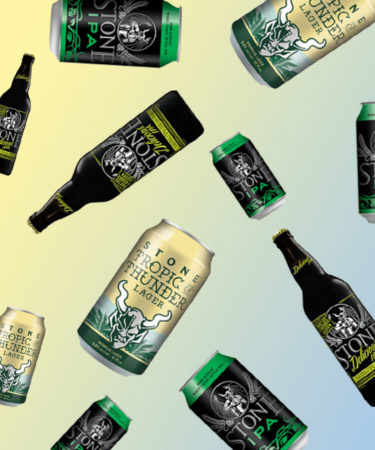In 1996, Stone Brewing co-founders Steve Wagner and Greg Koch “purchased a 30-barrel brewing system and set out to change the world,” according to company lore. They started with their first keg sale in July 1996.
Stone produced 400 barrels of beer by the end of that year. In 2018, it made 400,000 barrels of beer — that’s about 12,400,000 kegs. It’s now the ninth-largest craft brewing company in the U.S. by sales volume, distributing beer to all 50 states.
From its humble beginnings in San Marcos, Calif., to a dozen locations around the world, Stone is still rolling. Here are nine more things you should know about Stone Brewing.
Don't Miss A Drop
Get the latest in beer, wine, and cocktail culture sent straight to your inbox.Stone began when two musicians came to their senses.
Steve Wagner and Greg Koch originally met in 1989, when Wagner’s band rented studio space in Koch’s rehearsal studio. The two met again in a classroom: Years later, both attended a weekend class at UC Davis, “A Sensory Evaluation of Beer.” Three years after rekindling that friendship, Wagner and Koch opened the doors to their first Stone Brewing location in February 1996.
The first beers were not IPAs.
Although Stone became a staple of the San Diego beer scene for its aggressively hoppy West Coast-style IPAs, its first beers were a pale ale, a smoked porter, and a wheat ale. But hop-driven flavor was important out of the gate. According to Wagner, the first beer, Stone Pale Ale, added “American flair” to a traditional recipe by using Ahtanum hops. “[I]t made a different pale ale than I’d tasted before,” Wagner says in the company’s history. “This was what we wanted to start with; this was how we would begin to carve our identity.”
Stone released its first IPA in August 1997 for the brewery’s first anniversary. Its first double IPA accompanied the brewery’s fourth anniversary in 2000.
Stone Brewing is arrogant.
Stone debuted its Arrogant Bastard Ale in November 1997. The “Arrogant” brand split from Stone into its own label, Arrogant Consortia, in 2015. The “bastard family of beers,” as the company describes it, includes Oaked Arrogant Bastard Ale, Double Bastard Ale, Depth-Charged Double Bastard Ale, Bourbon Barrel-Aged Arrogant Bastard, Crime, Punishment, and Lucky Bastard Ale.
1990s metalheads, you’ve found your beer.
In September 2018, Arrogant Consortium launched Enter Night Pilsner, a headbanger-friendly hoppy pilsner brewed in collaboration with Metallica.
Stone’s co-founder loves attention.
Greg Koch is known to have a flair for the dramatic. Recently, this included such stunts as suing MillerCoors for using “Stone” in its Keystone marketing. Koch also starred in a documentary titled “The Beer Jesus from America,” chronicling his experiences building a brewery location in Berlin. Prophetically, that story does not have a happy ending.
Stone fans can beercation to 12 locations.
Stone moved from San Marcos to Escondido, Calif., in December 2005. It launched Stone Brewing World Bistro and Gardens – Escondido, a farm-to-table restaurant and beer garden concept, in November 2006. A second version, Stone Brewing World Bistro and Gardens – Liberty Station, launched in San Diego’s Point Loma neighborhood in May 2013.
It also launched a brewpub at San Diego International Airport in September 2013, an East Coast brewery in Richmond, Va., in October 2014, and a Napa location in May 2018.
Stone also opened Stone Brewing World Bistro & Gardens – Berlin in December 2015. However, that brewery shut down in April 2019 and was sold to BrewDog. A separate taproom in Berlin, launched in May 2018, remains.
Stone also introduced Stone Company Stores in 2011. The growler and gift shop concept now has locations in South Park, Oceanside, Pasadena, and Richmond, Va.
It’s a stone’s throw from Beijing.
In 2018, Stone became the first independent U.S. brewery to build and open a brewery in China. Stone Brewing Tap Room – Shanghai debuted in July 2018.
Stone’s gluten-reduced beer is delicious.
Delicious IPA is made with Lemondrop and El Dorado hops and crafted to reduce gluten. Like New Belgium’s Glütiny Pale Ale, Delicious is brewed like a “normal” IPA, then employs an enzyme to reduce gluten content.
It’s a sustainability GOAT.
Solar panels power 20 percent of Stone’s Escondido brewery; and the company repurposes spent grain as garden mulch, livestock feed, dog treats (called Stone Bones), and soaps; and is the first brewery to repurpose hops and yeast for cattle, chicken, and goat feed. Used fryer oil from its Escondido and Liberty Station locations is converted to biofuel by New Leaf Biofuel.
Stone’s Richmond brewery, in addition to being Leadership in Energy and Environmental Design (LEED) Silver-certified, is landscaped by goats. According to Stone, this helps restore the habitat.
